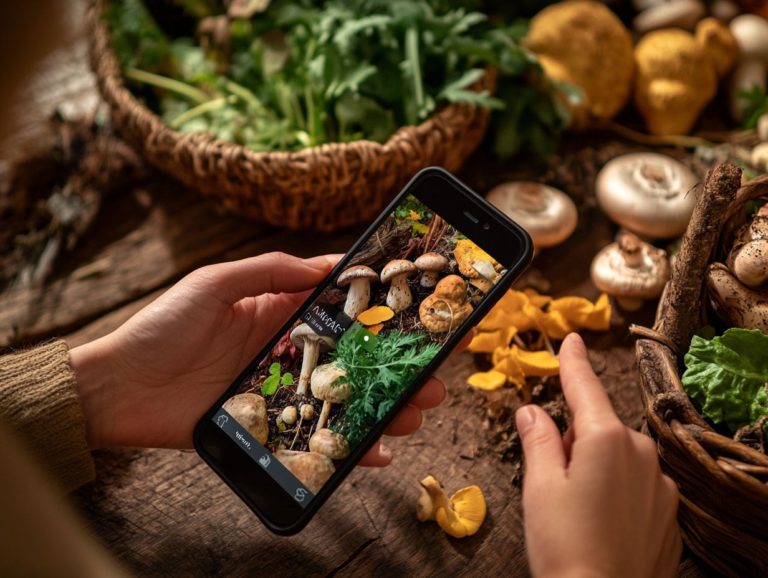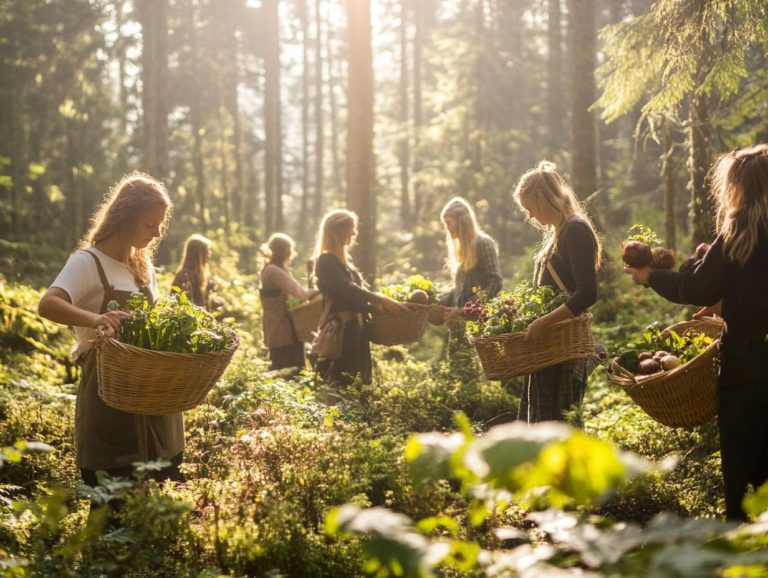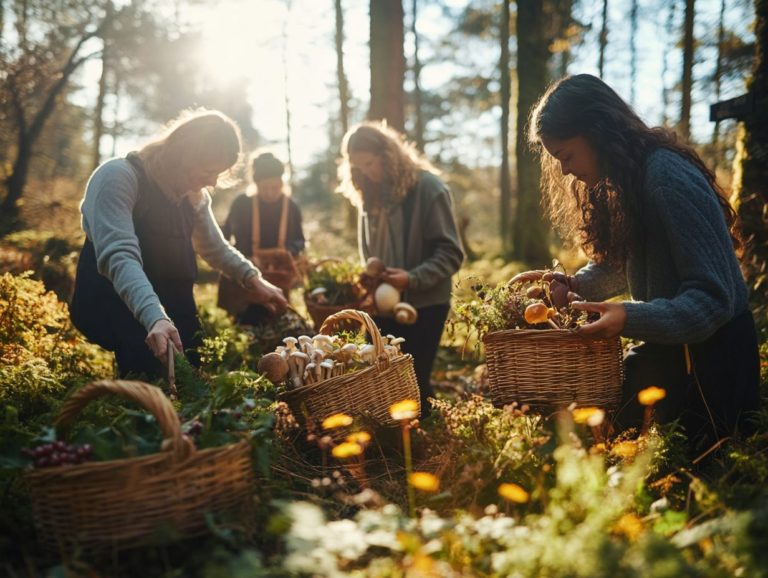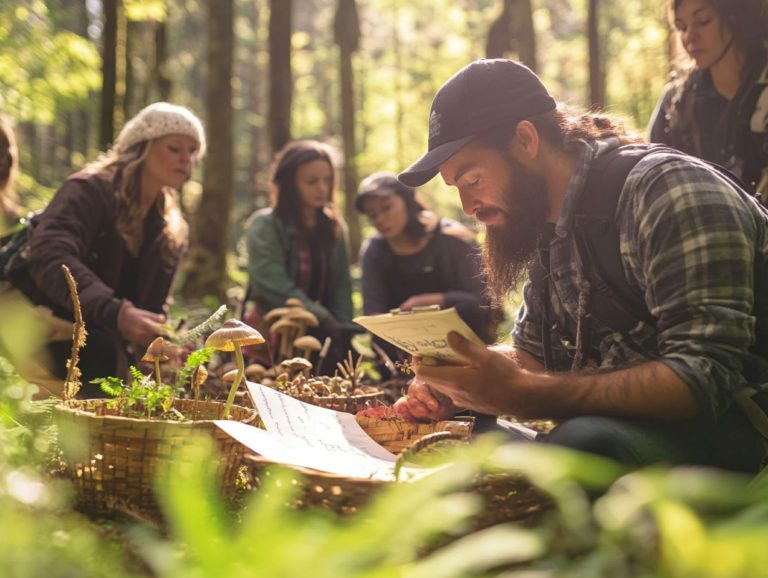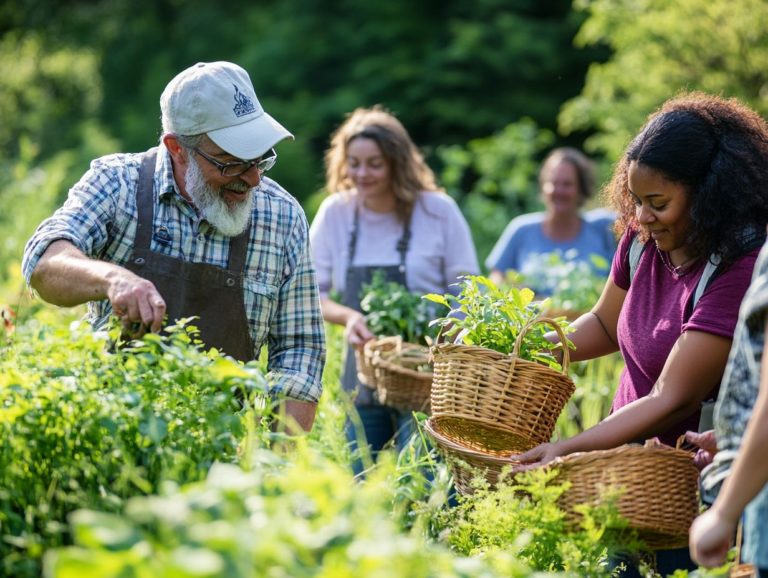How to Find Foraging Classes Locally
Foraging transcends mere hobby; it presents a unique opportunity to reconnect with nature, uncover delightful edible plants, and acquire invaluable skills.
This article delves into the many benefits of foraging locally, highlighting its positive influence on both the environment and personal health.
If you’re interested in discovering foraging classes nearby, what you can expect from these enriching sessions, and tips to elevate your learning experience, continue reading.
Embrace the adventure of foraging and discover the treasures nature has to offer!
Contents
Key Takeaways:
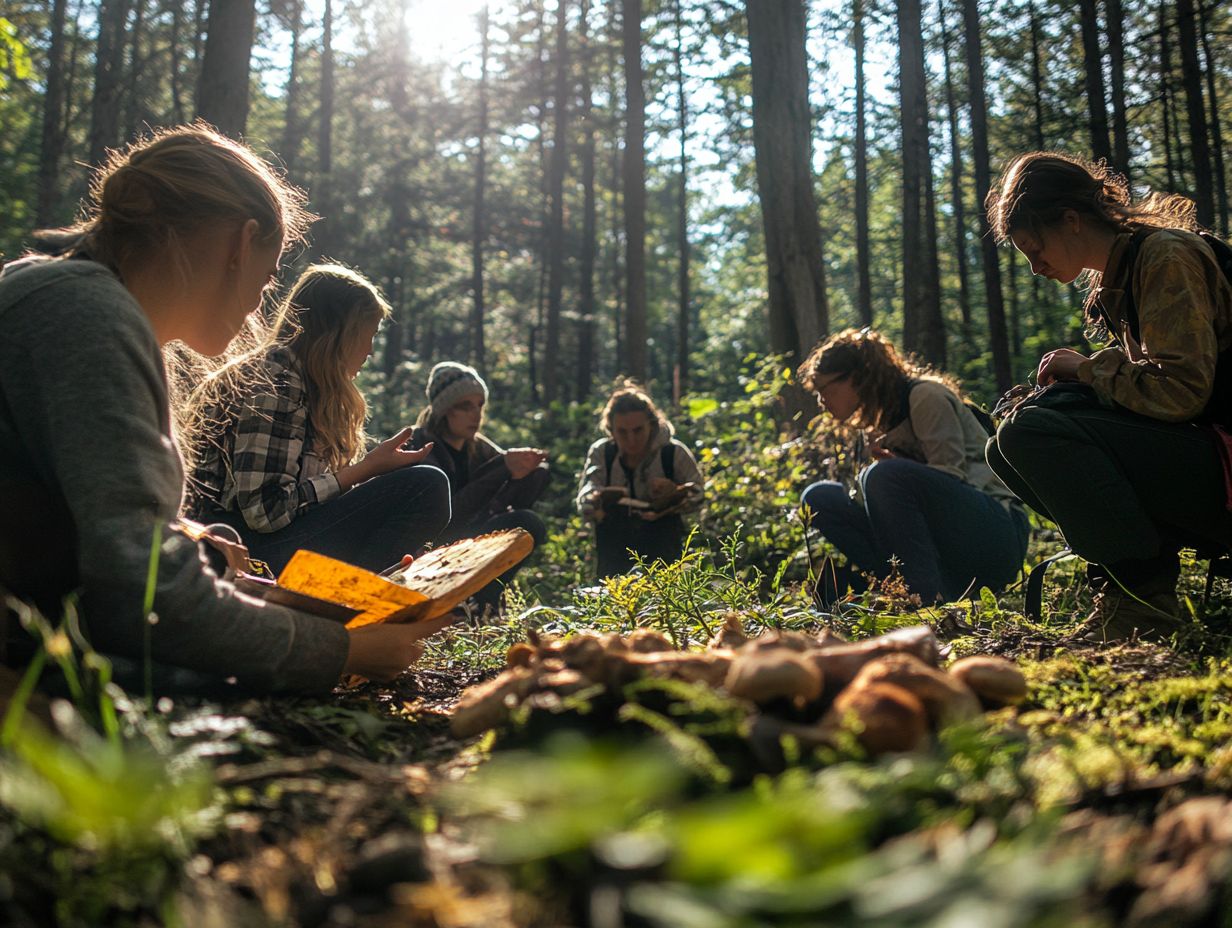
- Learn the art of foraging by taking local classes, which offer numerous benefits for both the environment and personal health.
- Research local options to find the right foraging class for you.
- Prepare beforehand to get the most out of your foraging classes.
What is Foraging and Why Take Classes?
Foraging is about gathering wild food resources think edible plants, mushrooms, and fruits that can elevate your culinary experiences and boost your nutritional health, which is important for staying healthy and strong.
In Texas, you can join foraging classes led by skilled instructors like Courtney Taylor from Local Leaf or Merriwether, who offer invaluable insights into identifying and harvesting wild edibles.
These classes immerse you in nature and promote sustainable practices, making foraging a rewarding journey for everyone, from curious beginners to seasoned enthusiasts.
Foraging is an ancient practice that our ancestors relied on, who depended on their surroundings for sustenance. Today, it s making a comeback as more individuals strive to reconnect with their food sources and appreciate the diverse ecosystems that surround them. In Texas, organizations such as Earth Native Wilderness School provide a range of classes tailored to different skill levels, from introductory sessions on basic plant identification to advanced workshops on mushroom foraging.
As participants, you ll delve into the safety and ethics of gathering wild edibles while discovering the health benefits these nutrient-rich foods offer. This fosters a deeper appreciation for nature and enriches your culinary heritage.
Benefits of Foraging Locally
Foraging locally presents a wealth of environmental and health benefits that enhance both your well-being and the ecological balance. By immersing yourself in nature through foraging, you cultivate a deeper connection to the environment, gain access to fresh and organic food, and actively support local biodiversity.
Engaging in community foraging initiatives heightens your awareness of the natural world around you, enabling you to appreciate the nutritional value of wild edibles while championing sustainable practices.
Environmental and Health Benefits
Foraging offers significant environmental and health benefits, promoting sustainability while encouraging a diet rich in nutrient-dense wild edibles that often surpass the flavor and nutrition of their farmed counterparts. When you engage in foraging, you cultivate a deeper appreciation for local ecosystems and biodiversity, giving you the power to make informed choices about your food sources.
The communal experience of foraging also enhances your social connections and fosters a sense of responsibility toward nature, ultimately guiding you toward a healthier lifestyle.
Not only does foraging give you a unique way to connect with the environment, but studies show that wild edibles can deliver a nutritional boost, frequently containing higher levels of vitamins, minerals, and antioxidants compared to domesticated options. For instance, research indicates that wild greens can offer up to three times more Vitamin C and twice the iron of their cultivated counterparts.
By choosing to forage, you can significantly reduce your carbon footprint, as this practice encourages local consumption and minimizes reliance on industrial agriculture, paving the way for a more sustainable food system that prioritizes ecological balance and your personal well-being.
Ready to explore the world of foraging? Join a class today and start your adventure!
How to Find Foraging Classes Near You
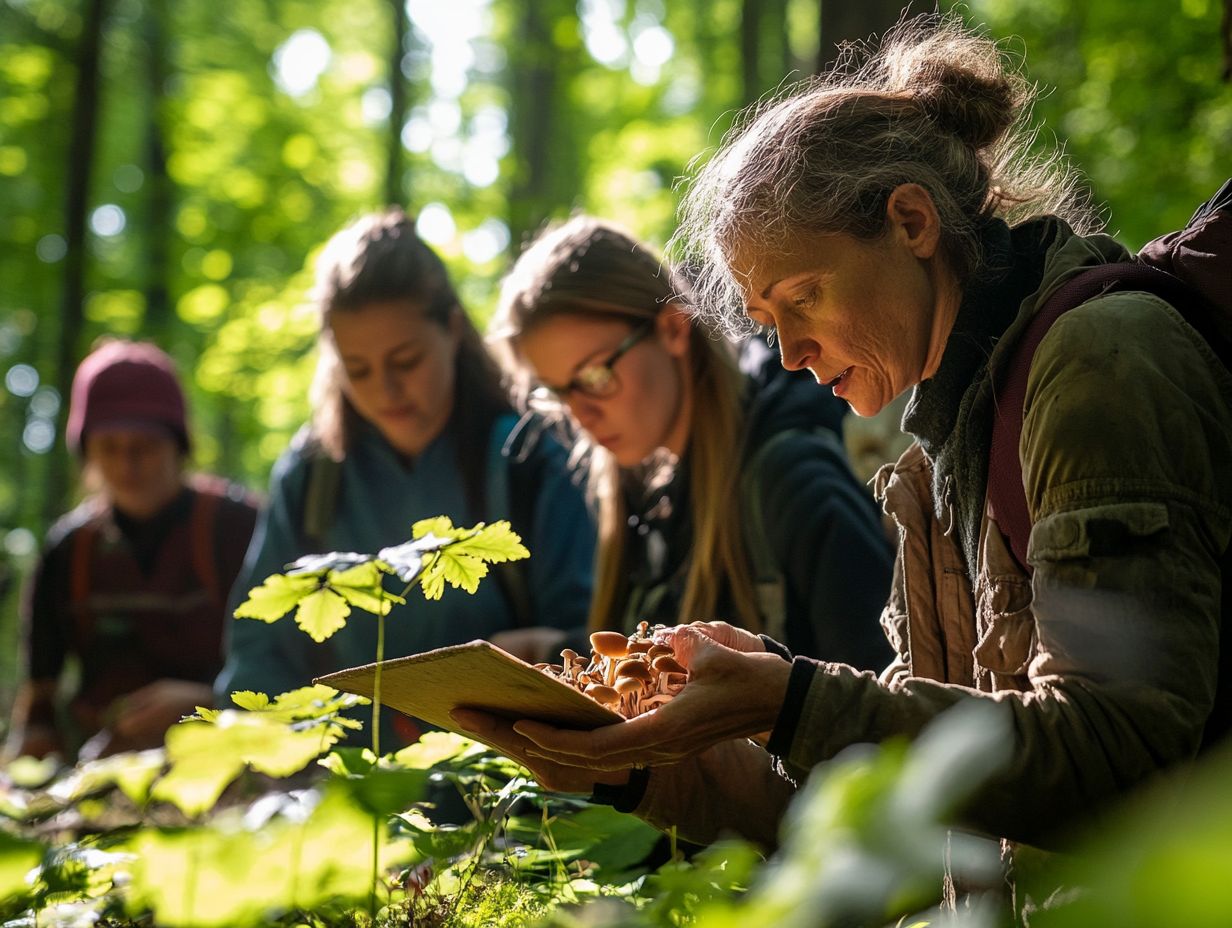
Discovering foraging classes in your area can be an exhilarating journey that deepens your connection with nature. To enhance your experience, learn how to find local foraging certifications where you’ll meet knowledgeable instructors and fellow enthusiasts who share your passion.
In Texas, a variety of organizations, such as Earth Native Wilderness School, along with local foraging groups led by experts like Merriwether, provide structured classes tailored to different skill levels.
These engaging sessions typically unfold in community settings, parks, or dedicated foraging events. This gives you the chance to immerse yourself in hands-on learning within a vibrant natural environment.
Researching Local Options
To effectively research local foraging options, leverage various resources. Check out social media platforms like Instagram and Facebook, local community boards, and websites dedicated to foraging education. For detailed guidance, you can refer to how to master foraging in your region. Many foraging enthusiasts share their experiences online, offering valuable insights into the best local classes and events in Texas.
Reaching out to organizations such as Earth Native Wilderness School or local instructors like Merriwether can help you uncover hidden gems in your area.
By tapping into these diverse channels, you can gain foundational knowledge and expert advice tailored to your region. Engaging with local foraging communities through workshops or meet-ups will significantly enhance your learning experience.
Don’t hesitate to ask questions during the class to deepen your understanding! Participating in such gatherings enables you to build a network of fellow foragers, fostering a deeper appreciation for nature and its abundant offerings.
What to Expect in a Foraging Class
When you attend a foraging class, get ready for an exciting hands-on experience that combines practical learning with vital knowledge about wild edibles and their identification, including online courses for foraging enthusiasts.
Instructors will guide you through diverse habitats, illustrating the distinctive characteristics of edible plants, mushrooms, and other foraged treasures. These classes help build a community, allowing you to share your discoveries and experiences while learning from both your fellow participants and the instructor.
Class Structure and Activities
Foraging classes typically offer a well-structured curriculum that combines educational lectures on local flora with top local foraging events and hands-on foraging activities in natural settings.
Your experience often begins with theoretical lessons that explore plant identification, ecological relationships, and the nutritional benefits of various wild edibles. You ll be introduced to an array of key resources, including field guides and apps that enhance your foraging skills.
As the class progresses, you ll dive into immersive experiences, identifying mushrooms in wooded areas or foraging for wild greens along riverbanks. Safety education is paramount, equipping you with key safety tips about potential poisons and safe harvesting practices.
These classes are thoughtfully tailored to accommodate various skill levels, creating a supportive atmosphere that s perfect for learning and sharing your newfound passion.
Tips for Making the Most of Foraging Classes
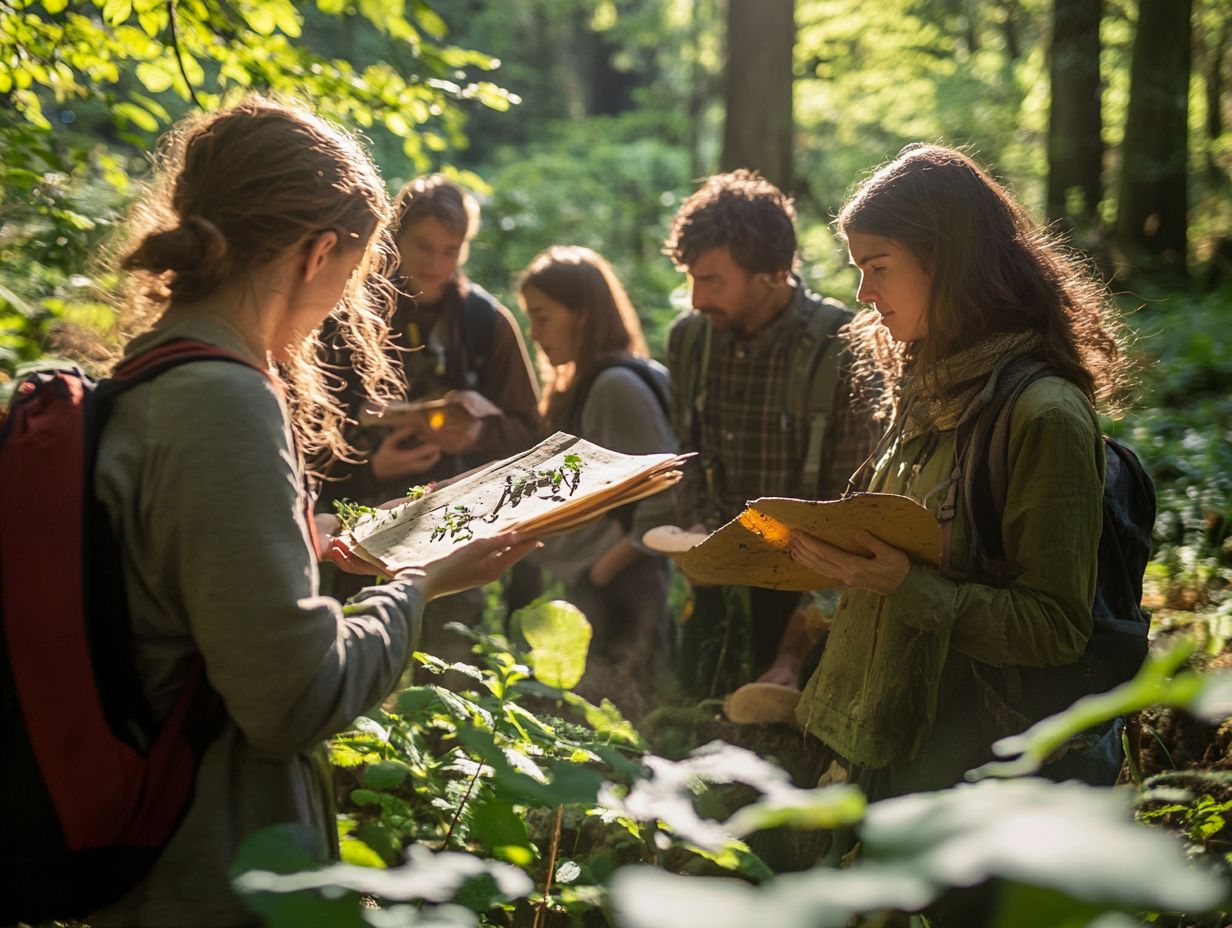
To truly maximize the benefits of foraging classes, come prepared with an open mind and a genuine willingness to engage with both nature and your fellow classmates.
Consider researching local flora beforehand, bringing the right gear, and being ready to share your personal experiences or questions with the instructors. This proactive mindset enhances your learning experience and cultivates a strong sense of community among all attendees.
Now is the perfect time to sign up for a class or reach out to local groups for more information on how to organize a local foraging event! Your journey into foraging awaits!
Preparing for Class and Applying Knowledge
Effective preparation for your foraging classes means diving into the basics of local wild edibles, getting familiar with the necessary tools, and embracing the thrill of new learning experiences. Bring along a notebook to jot down observations and questions, which will help you apply your newfound knowledge in real-world foraging scenarios. Engaging with others during the class opens doors to valuable insights and friendships, enriching the experience.
Researching local species before the class builds your confidence and understanding. Knowing which plants are in season and where they typically thrive deepens your connection to the environment. Equipping yourself with the right tools, like baskets or field guides, boosts your efficiency and demonstrates your commitment.
Documenting your experiences including encounters with fellow foragers and the insights you gather fosters personal growth and strengthens community ties. Every outing becomes more than just a learning experience; it transforms into a vibrant journey of shared insights and community.
Final Thoughts and Recommendations
Participating in foraging classes presents a unique opportunity for you to connect with nature, delve into sustainable practices, and engage with a community of like-minded individuals who share a passion for wild edibles. If you’re interested in taking your experience further, consider joining local foraging groups for sustainability. Whether you’re just starting out or have some experience under your belt, these classes offer invaluable insights into the fascinating world of foraging and its many benefits. Embracing this enriching experience can lead to healthier eating habits and deepen your appreciation for the environment.
Foraging not only enhances your understanding of local ecosystems, but it also fosters friendships and connections that elevate the entire experience. Participants often share tips and stories, enriching your knowledge while helping to cultivate a supportive network.
By engaging in such activities, you play a vital role in promoting sustainable practices that respect and protect our natural resources. If you re curious and eager to learn, seeking out local foraging classes could be a transformative step toward a fulfilling, eco-conscious lifestyle.
Frequently Asked Questions
Where can I find foraging classes near me?
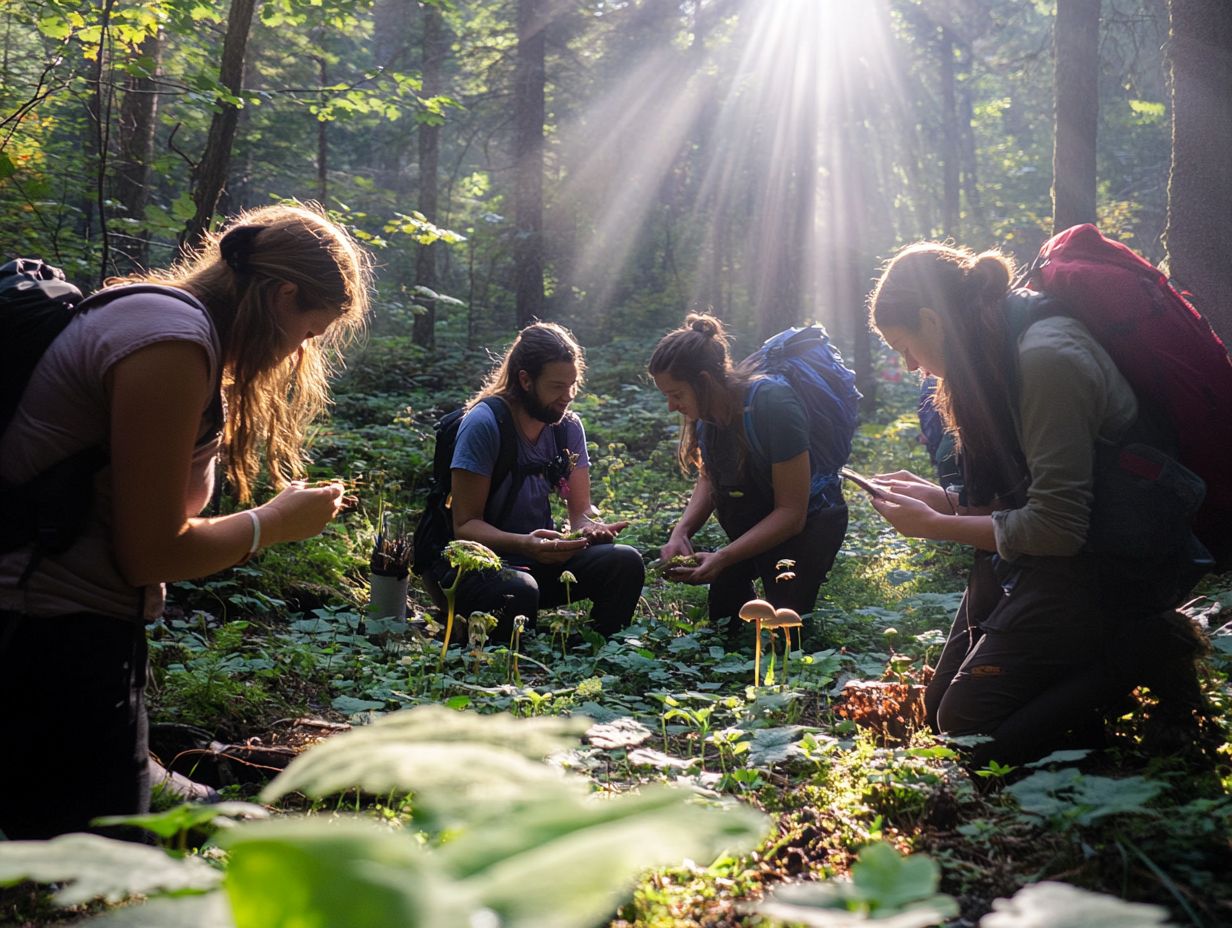
You can start by checking with your local agricultural extension office, community colleges, or nature centers. Additionally, you can search online for local foraging classes or groups.
Do I need any prior experience to attend a foraging class?
No, most foraging classes are suitable for beginners. However, it’s always a good idea to check with the instructor beforehand to make sure the class is a good fit for you.
What can I expect to learn in a foraging class?
In a foraging class, you will learn about different edible plants, how to identify them, and how to sustainably harvest them. You may also learn about traditional and modern uses for these plants, as well as how to promote foraging techniques in your area.
How long do foraging classes usually last?
The length of a foraging class can vary, but most classes are around 2-3 hours long. Some may be shorter or longer, depending on the instructor and the material being covered.
Are there any age restrictions for attending a foraging class?
This can vary depending on the instructor and the location of the class. Some classes may have age restrictions, while others may be family-friendly. It’s best to check with the instructor beforehand if you plan on bringing children.
What should I bring to a foraging class?
- A notebook
- A pen
- A water bottle
- Appropriate clothing
- Insect repellent
- Sunscreen
Don’t miss out on this exciting opportunity! Sign up for local foraging classes and learn how to use Meetup for local foraging events to enhance your skills and connect with nature.

